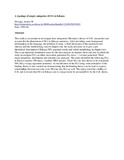| dc.contributor.author | Mwangi, Jacinta W | |
| dc.date.accessioned | 2013-05-02T08:25:43Z | |
| dc.date.available | 2013-05-02T08:25:43Z | |
| dc.date.issued | 1992-06 | |
| dc.identifier.citation | Mwangi, J.W.(1992).A typology of empty categories (ECS) in Kikuyu | en |
| dc.identifier.uri | http://erepository.uonbi.ac.ke:8080/xmlui/handle/123456789/18283 | |
| dc.description | MA - Thesis | en |
| dc.description.abstract | This study is an attempt to investigate how adequately
Chomsky's theory of G.B. can predict and account
for the phenomena of ECs in Kikuyu sentences.
After providing some background information on the
language. the problem of study. a brief discussion of
the analytical tool (theory) and the methodology used in
chapter one. the study proceeds on to give a pre-theoretica1
description of Kikuyu NPs. question words and
verbal morphology in chapter two. This is an important
foundation stone for the data analysis in chapters three
and four in which the study investigates ECs as either
movement generated (by move ~ ) or base generated.
Their major properties. distribution and reference are
analysed.
The study identified the following ECs in Kikuyu
namely; NP=trace. variables PRO and pro. These ECs are
also shown to be essentially NPs (they occupy argument
positions).
A classification of the ECs using some principles
of the binding theory is also carried out demonstrating
that the binding theory can be used to express relationships
between not only overt NPs but also ECs as well.
The study tested the validity of G.B. and it reveals
that ECs in Kikuyu can to a large extent be accounted
for by the G.B. theory. | en |
| dc.description.sponsorship | University of Nairobi | en |
| dc.language.iso | en | en |
| dc.subject | Typology | en |
| dc.subject | Empty categories | en |
| dc.subject | (ECS) | en |
| dc.subject | Kikuyu | en |
| dc.title | A typology of empty categories (ECS) in Kikuyu | en |
| dc.type | Thesis | en |
| local.publisher | Department of Linguistic and African Languages, University of Nairobi | en |

